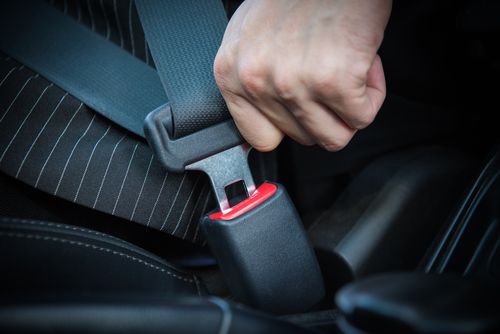Yes, your auto insurance provider likely requires you to notify them about a crash regardless of fault. Insurance policies are contracts between the policyholder and the insurance company, and these contracts often have many stipulations.
One of them is usually that you must call your insurance company after a crash, even if it’s not your fault. There are often deadlines on how long you have, so calling as soon as possible is recommended.
Most car accident attorneys recommend limiting what you say on these calls. While you must notify the insurer about the crash, you should not agree to a recorded statement or offer any details about what happened beyond the date, time, and location, until you speak with an attorney. The insurance company will have access to other information later if necessary.
For a free legal consultation, call 516-451-7900
Most Insurance Companies Require Policyholders to Notify Them of Any Crash
If your insurer requires you to notify them of any collision involving your covered vehicle, this information should be listed in your policy (along with the timeline for calling them). Generally, the timeline is vague. It may say “promptly” or use similar verbiage. However, some policies list a strict deadline, such as 24 hours or up to seven days after the collision.
Missing a strict deadline by a few days is unlikely to void your policy, but you should contact the company to tell them a crash occurred as soon as possible. However, there is no need to give them any details about the collision. Offer general facts such as time and location but do not explain what happened or who you believe caused the crash.
Your insurer and everyone else who needs to learn more about the case will get additional information about the circumstances and those involved later. They have the same access to the police report, eyewitness statements, and other evidence that you and your attorney do.
Will I File a Claim With My Insurance Company?
Your insurance company may recommend letting them take care of your claim. This is often possible if you carry “full coverage” insurance, which could include collision coverage for car repairs and medical coverage for your injuries. In some cases, you might want to file a claim with your insurer just to get the process moving. However, there are pros and cons to this decision, including that you will need to pay a deductible.
In some states, you will need to contact your insurer because you must file a claim based on your own no-fault coverage. Known as a personal injury protection (PIP) policy, several states mandate no-fault coverage, and some even require drivers to turn to this policy first after a crash. For someone with relatively minor injuries and basic losses, PIP coverage could be the best way to recover compensation quickly.
How Do I Handle the At-Fault Driver’s Insurance Company?
Most of the time, crash victims will file their claims with the at-fault driver’s insurance company. However, most attorneys recommend that victims still do not speak with this insurer beyond a basic reporting of the claim. You do not have a contract to cooperate with them or describe the crash, so the best thing to do is err on the side of caution.
Insurance company adjusters often use tactics that could hurt your financial recovery or cause problems with getting a fair payout later. For this reason, attorneys often recommend letting them handle all communication with the at-fault driver’s insurer after an injury collision.
How an Insurance Company Might Try to Lower the Value of Your Claim
Depending on the circumstances, some of the tactics used by adjusters could lead to a reduction in claim value or an outright denial. When a lawyer manages all communication with the insurance company, it helps protect your right to pursue fair compensation.
Some of the things the insurance company might try include:
- Delaying the claim unnecessarily
- Making a quick, lowball offer before you know the value of your case
- Downplaying the severity of your injuries
- Alleging some injuries happened in another way
- Using your own words or social media posts against you
Many insurance companies will ask for a recorded statement as part of investigating the crash. They will tell you they need to hear what happened in your own words to determine how much money you should recover. Lawyers strongly advise not to do this. It will not help your case instead, the insurer will likely try to use your words against you to reduce your payout.
Consider hiring a car accident lawyer to protect your rights while filing an insurance claim and seeking compensation. Your attorney can handle all communication with the insurance company and ensure that your right to recover a fair payout remains intact.
What Are My Options for Compensation After a Collision?
Crash victims often have several options for seeking compensation after a collision.
Deciding which one is best for you will depend on:
- The laws in your state
- The circumstances of the crash
- The insurance coverage available
- The severity of your injuries
- The long-term effects of your injuries
Your State’s Insurance Requirements
Most states have insurance requirements focused on fault-based claims, and state law requires all drivers to carry auto liability coverage.
These policies provide compensation for the crash victim, including:
- A minimum amount for bodily injury to one victim
- A minimum amount for all victims of a single crash
- A minimum amount for property damage
For example, if your state requires a “25/50/10” liability policy, it would provide coverage up to:
- $25,000 for injuries to one victim
- $50,000 for injuries to all victims hurt
- $10,000 for car repairs
These policies pay for the losses and expenses caused by the policyholder. So, if you file a fault-based claim, the other driver’s insurance company should pay.
Does Fault Even Matter?
Some people wonder if fault even matters. The truth is that it does. Even in states that require no-fault coverage, these policies only cover basic expenses and losses, such as medical bills and a portion of your lost wages. There are exceptions to these laws that allow some crash victims to file fault-based actions as well, enabling them to pursue additional damages such as pain and suffering.
If the at-fault driver’s insurance company refuses to offer a fair settlement or there’s some other reason why your attorney believes your case should go to trial, a lawsuit may also be possible. Suing the at-fault driver could allow you to hold them accountable through a jury verdict and court award.
How Do I Know How Much My Crash Case Is Worth?
Understanding how much your crash case is worth is vital to recovering fair compensation. If you do not know how much the collision and your injuries truly cost, then you cannot know when the insurer makes a fair offer. Pursuing an appropriate payout helps ensure that you do not have to pay for future or ongoing expenses out of your pocket.
The first step in knowing how much your case might be worth is understanding the recoverable damages. No two car accidents are the same, and there is no one-size-fits-all payout, even in similar cases. The damages can differ widely from case to case.
Examples of Recoverable Damages
Some common recoverable damages in a fault-based car crash case include:
- Medical expenses to date
- Future or ongoing care costs
- Lost income from missed work
- Diminished earning capacity
- Related expenses
- Pain and suffering
To understand the value of your case, you need to document these damages. Gathering evidence that backs up your claim is essential to getting the money you deserve.
This evidence could include:
- Bills
- Receipts
- Tax documents
- Paychecks
- Relevant medical records
Of course, these documents do not all tell the full story. Establishing the value of your future care needs and intangible losses is more difficult. Working with an attorney can greatly improve your accuracy for these damages. Lawyers often take steps such as interviewing medical experts and analyzing similar cases to determine the cost of future care and put a price on pain and suffering losses.
Once your attorney establishes a fair settlement range for your case, they can proceed with the next steps, such as sending a demand letter to the insurance company, negotiating a settlement with the insurance adjuster, or preparing the case for trial.
Proving Fault and Liability in a Collision Case
In many crash cases, recovering compensation requires proving that the other driver caused the collision and their carelessness or recklessness behind the wheel led directly to your injuries and losses. In a legal case, this is known as negligence.
A negligent driver is the cause of most traffic accidents.
To show a driver’s negligence, the victim must establish four legal elements:
- Duty of care
- Breach of duty
- Causation
- Harm
In most cases, duty of care comes from a traffic law the at-fault driver violated. For example, drivers have a responsibility to obey traffic signals. When a driver runs a red light, they breach that duty.
Gathering Evidence
To show that negligence occurred, evidence is necessary. An attorney knows about the various types of evidence that are usually available and how to find them.
Examples of potential evidence include:
- The crash report filed by responding officers
- Video footage of the collision
- Pictures from the crash scene
- A scene survey
- Accident reconstruction
- Eyewitness statements
- Relevant medical records
- Expert testimony
- Documentation of damages
The goal of gathering evidence to support a claim or lawsuit is to show the insurer (and the judge and jury if your case goes to trial) what happened and how the accident affected you. Organizing solid evidence in a way that best tells your story and illustrates your damages is the key to recovering a fair payout in a fault-based car accident case.
Do I Need to Hire an Attorney for My Collision Case?
Contacting a lawyer to handle your collision case is generally the best way to protect your rights and pursue fair compensation based on state and local laws.
Attorneys have the knowledge, experience, and resources to navigate the legal process and secure compensation for their clients, whether that requires:
- Assisting with no-fault claims
- Negotiating an auto liability insurance claim with the at-fault driver’s insurer
- Suing the at-fault driver and going to trial
Hiring a lawyer to develop a strategy, build a solid case on your behalf, and represent your best interests can greatly reduce your stress as you heal. Working with an attorney also increases the likelihood that you will get a fair financial recovery and justice in your case. You do not have to handle your insurance claim on your own you can get professional legal help with no cost up front.
Have Concerns About Affording an Attorney?
Personal injury law firms in Long Island generally provide free initial consultations for crash victims. During the meeting, a team member will assess the circumstances of your collision, explain the applicable laws, and determine your best option based on what happened. There is no obligation to sign a contract with the firm after this conversation, so you have nothing to lose.
Most personal injury attorneys who handle car crash cases in Long Island also work on a contingency basis and do not ask clients to pay anything upfront. They understand the weeks and months following a collision are expensive, and you likely have a lot of out-of-pocket expenses related to your treatment and care. Charging you nothing up-front ensures that anyone can afford legal representation.
Learn More About Your Legal Options
Your best protection after a crash is to work with a collision attorney who is familiar with local laws and knows how to navigate car accident cases. You can get a free consultation to discuss what happened and find out what compensation you deserve based on the laws in your state.
Contact a good personal injury attorney in Long Island near you today to assess your legal options and determine your next steps.








